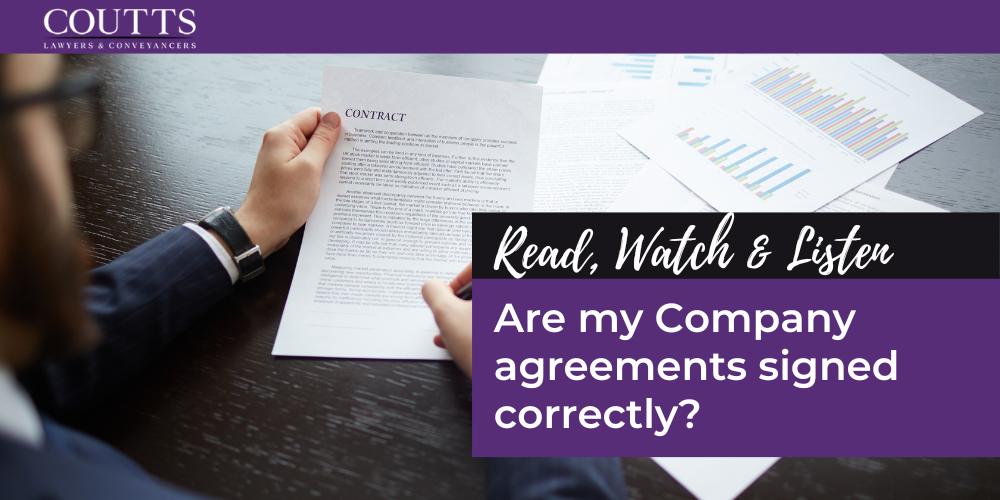Below we have answered some of the key questions about a company seal and signing of company documents, together with some key considerations regarding signature of an agent of a company.
- Can I have only one director sign an agreement under the Corporations Act? If you don’t use a company seal, agreements need to be signed in accordance with section 127 of the Corporations Act:
- by two directors of the Company; or
- by one director and one secretary of the Company; or
- for a proprietary company, where there is a sole director/secretary, by that person.
- What is the difference between a common seal or a company seal or a corporate seal? Nothing- these are all different terms for the same thing.
- Does the Company need to have a company seal? A company seal is like an old-fashioned stamp with ink, that is used at times when something would need to be “signed” by the Company. Generally, since 1 July 1998, there is no longer a requirement to have a company seal and quite often, companies are no longer using such a seal. Formerly, the company seal was used for signing Deeds. However, it is really important to ensure before signing any Company agreements or documents that you check whether your Company constitution lists any specific instances where the company seal must be used.
- We already have a company seal, what should I check on it to ensure it is right? The company seal should display the full formal name of the company, the words “common seal”, the letters “ACN” or expression “Australian Company Number” followed by the full numerical ACN.
Alternatively, if the Company uses an ABN in place of the ACN, the company seal should display the full name of the company, the words “common seal”, the letters “ABN” or expression “Australian Business Name” followed by the full numerical ABN.
- When do I use the company seal? As above, generally there is no requirement for a company seal to be used when signing documents, but often it is used for agreements over a certain dollar value (material agreements) or agreements dealing with real property.
- Is it sufficient just to stamp the company seal on the relevant agreement or document? No, the use of the company seal needs to be witnessed by:
- two directors of the Company; or
- by one director and one secretary of the Company; or
- for a proprietary company, where there is a sole director/secretary, by that person.
- It is important to abide by the provisions in your Company constitution regarding using the company seal. Generally speaking, to use the company seal, first a board resolution would be passed, agreeing to using the company seal and then the use of the company seal would be recorded in the company seal register. This is a register maintained by a company officer, noting the relevant board resolution relating to each instance of use.
- What if the Company has a company seal and it is no longer used? Whether or not the company seal is used, it needs to be stored securely and should not be disposed of. Given it is essentially the “signature” of the Company, it needs to be protected as such.
- If an agreement has not been signed properly, is the Company bound by it? Contracts can be unenforceable if they are not properly signed by the Company, however this is typically examined on a case by case basis for each particular instance. Naturally, it is better to ensure that contracts are signed properly!
- What if a person is signing as agent? Exercise caution! It is really important you satisfy yourself that the person signing has authority to bind the company. From a practical perspective you can ask for written evidence of the authority. If a person (including a director) has signed as agent for the Company, they can be personally liable, particularly if they represented that they had authority to enter into the contract. In this case, the person signing as agent could be up for damages for breaching any warranty of authority that was given.
- What if I am asked to sign as an agent? You should be sure that there is appropriate written documentation (e.g. a company resolution) showing the agency and the extent of the agency and supporting you signing the document as an agent of the company. Any limits on the agency should be clear to you. You need to exercise caution as you can be personally liable if you represent you have authority to bind the company and there is insufficient or no authority.
For further information, or a review of your company constitution or agreements, please don’t hesitate to Contact Coutts today.



